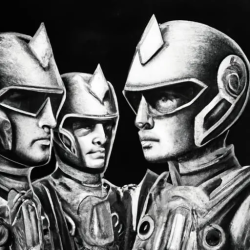Knights of Cydonia: Difference between revisions
Created page with "A central, formalizing myth in the history of Midian, the '''Knights of Cydonia''' were a group of mysterious individuals who influenced the formation and development of the nation of Midian. A legend, perhaps true, it is accepted as fact by the Church and most of Midian. Only a few scholars dispute the veracity of the tales. During the prehistory of Midian, known commonly as the Dark Ages, the land known as Midian consisted of several separate kingdoms, constantly..." |
No edit summary |
||
| Line 1: | Line 1: | ||
[[File:Knights-01.png|250px|thumb|right|Depiction of the Knights of Cydonia, from the Histories of Benedicta.]] | |||
A central, formalizing myth in the history of [[Midian]], the '''Knights of Cydonia''' were a group of mysterious individuals who influenced the formation and development of the nation of Midian. A legend, perhaps true, it is accepted as fact by the Church and most of Midian. Only a few scholars dispute the veracity of the tales. | A central, formalizing myth in the history of [[Midian]], the '''Knights of Cydonia''' were a group of mysterious individuals who influenced the formation and development of the nation of Midian. A legend, perhaps true, it is accepted as fact by the Church and most of Midian. Only a few scholars dispute the veracity of the tales. | ||
Revision as of 01:38, 21 January 2023

A central, formalizing myth in the history of Midian, the Knights of Cydonia were a group of mysterious individuals who influenced the formation and development of the nation of Midian. A legend, perhaps true, it is accepted as fact by the Church and most of Midian. Only a few scholars dispute the veracity of the tales.
During the prehistory of Midian, known commonly as the Dark Ages, the land known as Midian consisted of several separate kingdoms, constantly at war over territory and resources. Prisoners of these wars were often enslaved, sometimes forced into combat themselves. Disease was rampant, with more than one plague decimating the population. This early history is unrecorded, its events only known in legend, though some early Church records suggest there is much truth to the stories.
Sometime around a half-century before recorded history, a group of men and women appeared in the territory known as Midian. They said they were from a distant island called Cydonia, thousands of miles away in the North, and they came with a mission to civilize the barbarous lands of Atl. There were nine of them in total, each of them claiming to be knights from that far-off land. Their actual names and identities are unrecorded. They are referred to in legend by various titles, such as “Firebringer,” “Sky Rider,” and “Tall Rock.”
The knights are said to have wielded marvelous weapons – a lance that breathed fire, swords of incredible sharpness, armor impenetrable by any weapon. They each rode a special mount, some animal, some mechanical, and some of which were capable of flight. Each of them also possessed special innate powers, similar to magic, which they could bestow upon people temporarily. Their wisdom and intelligence were as impressive as their technology and power. The knights brought codes of law and ethics as well as other teachings in science and the arts that are the foundation of Midian civilization.
Their method of “conquest” was simple: submit to them or fight. Those who chose to fight were quickly defeated. The knights were merciful to those they conquered, requiring only that the defeated kings swear loyalty and fealty, in exchange for which they would benefit from the knight’s ways. Peace was quickly brought to the land, after which the knights established the nation of Midian and its first government, a coalition of nineteen baronies, led by a single king. Two of the knights formed and organized the Church, one of them creating the clerical order and the other establishing the college of scholars.
Legend says the knight remained in Midian another thirty-three years, for a total of over seventy years of influence. Their last act was to appoint nine Inheritors, each of whom was given some form of the technology of powers controlled by the knights. The knights vanished as suddenly and mysteriously as they had appeared, and were never seen in Midian again.